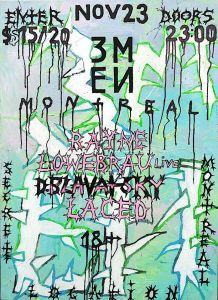Eating disorders exist in the public consciousness with a layered and multi-faceted presence. Discussions of aesthetic acceptability are frequently camouflaged by dialogue of the “body positivity movement.” As a result, the topic of eating disorders brings along a host of terms and opposing ideologies which examine what it means to be and, more importantly, to look healthy. In the midst of such a discussion, the experience of negotiating sexuality while recovering from an eating disorder often goes overlooked. Instead, it is glossed over by well-meaning sentiments of “self-love” and “self-care.” Having suffered from an eating disorder myself, I wish to attest to the anxiety and confusion of this experience. Both during the most severe stages of my eating disorder and throughout my process of recovery, I have had to contend with what it means to push myself beyond the bounds of my body dysmorphia while protecting myself from undesired or shameful sexual experiences. I have tried to navigate what it means to be young and open to new experiences, while constantly hating myself and wanting to change my body. I have had to question, on an ongoing basis, what it looks like to practice self-care while pushing myself outside of my comfort zone.
I entered university during a period of weight loss. Wanting to make a good first impression on my peers, I felt that I would be more attractive if I managed to avoid gaining the dreaded “freshman fifteen.” I hooked up with a few guys that year, keeping each experience decidedly PG. I had had some high school experiences before I was ready, and decided that in first-year I would follow my instincts, taking each experience as slowly and carefully as I desired. In the end, I was happy with my decision and look back on those experiences with satisfaction, knowing that I did as much as I had wanted at the time. Throughout each experience, however, there was one constant: I was certain that I was only desirable because of my weight. I convinced myself that if I gained the slightest bit of fat on my stomach, not only would they never have approached me in the first place, but later they would have been ashamed of what they had done. This fear was further exacerbated by the fact that I didn’t have any “female assets” to fall back on. Due to my early-onset starvation, I hadn’t allowed my body to progress at a normal rate and develop the curves which would usually appear following puberty. As a result, I concluded that if I continued to gain weight there would be no source of physical attraction; I was afraid I would be rendered a genderless blob.
Notwithstanding my best efforts to direct my body otherwise, at the end of my first year of school I entered a period of weight gain. Despite managing to avoid late-night MedPizza or Chef on Call’s onslaught of curly fries, chicken tenders, and milkshakes, I ended up binging on “healthy food” in the privacy of my dorm room. My body was crying out for help, and as a result, it latched onto whatever fuel I made readily available: for me, that meant fruit, granola, and peanut butter— lots and lots of peanut butter. During that summer I tried to decipher my changing relationship to my body. Unsure of how to move forward, I avoided going out or opening myself up to new experiences. The few nights I managed to make it out of the house, I relied on alcohol to calm my weight-related anxieties. I couldn’t imagine how anyone would ever find me attractive to begin with, never mind want to sleep with me.
Second-year wasn’t the first time I started off the school year amidst a period of weight gain, but it was the first time I actively decided not to fight it. During the preceding five years, I had gone through a perpetual cycle of loss and gain, each lasting for approximately a year at a time. In the periods of loss I was constantly tired, thinking about food, and terrified of gaining weight. At the same time, I maintained a superiority complex that stemmed from my ability to drape clothes onto my body as if I was a walking hanger. I experienced the constant paradox of self-hatred and self-aggrandizement. During the periods of gain, I was depressed, self-hating, and terrified. Not much had changed, other than the loss of my superiority complex—but at that point, the complex was all I had. My thinness had become the source of my self-worth: without it, I was lost. I was determined to make this time different. I began to see a therapist who helped me slowly convert my warped eating disorder thoughts and abandon my attachment to societal conceptions of “wellness.”
Despite this shift in mentality, I still maintained a deep discomfort with myself and the way fabric clung to a body that seemed foreign to me. I began to examine previously benign facets of my body like forearms and ankles with a newly minted sense of disgust. At the same time, I became enraged at the thought of the immense value I attributed to aesthetic appearance and the more meaningful ways in which my time self-assessing could be spent otherwise. The convergence of these opposing thoughts combined with the attempt to maintain an interest in school and a healthy social life proved difficult to say the least. The idea of pursuing any sort of sexual satisfaction or romantic relationship seemed impossible.
Notwithstanding the seeming hopelessness of my situation, slowly, throughout the course of the year, my mental health began to improve. I became accustomed to my new body and the way the weight clung to my thighs and hips. I didn’t love it, but I understood it; I was used to it.
During my third year at university, I felt new confidence blooming in me that had little to do with my weight. It was both intrinsic and overtly aesthetic. I began to see my individuality in a new light, and as such, it seeped into my physicality. It wasn’t the same high that I got from feeling super skinny but a more sustainable, tangible resonance with myself as a person.
I have thought a lot about whether or not I should write about my eating disorder. I wondered which aspects of experience I should comment on, and which I should leave out. I’ve wondered whether anything I say could ever be helpful to others, and if so, would I truly be being honest? As you can probably imagine, I have read a lot of articles on eating disorders. I have spent time comparing my experience to that of others and trying to find ways to help untangle my own warped relationship to food. If I’m being honest, they have not been very helpful. Most often, these articles have left me feeling hopeless and confused. No one ever seems to be concrete enough in their answers, specific-enough in their solutions to solving this puzzle. I am afraid that in writing this I may similarly disappoint others.
The truth is that recovery is just as hard as everyone says it is. It is just as personal. But it is worth it. Initiating your own recovery requires accepting that you will never truly be ready to start. It entails pushing your body beyond the limits of what is comfortable, not just once, but time and time again. At times, it will feel more hopeless than ever before. And while this may all may seem overly melodramatic to someone who doesn’t suffer from an eating disorder, when you are in the midst of this mindset, eating a piece of bread really can seem like the end of the world. Not the world at large, but your own personal world, the one you’ve cultivated for yourself—the sense of comfort and security you have attributed to looking and feeling a certain way. For those who understand this feeling, you will reach a point after you’ve pushed yourself past these personal barriers time and time again when you can turn to yourself and say, “I don’t think about my body as often as I used to,” or “I’m not scared of food the way I used to be,” and even, “I don’t hate myself as much as I used to when I would eat ‘something bad.’” It is through those revelations, small and insignificant as they may seem, that you will start to feel secure. You will not have that same sense of superiority that you did on “a good day.” Rather, you will experience the same highs and lows as others do on a daily basis, one day more comfortable in your skin than the next. You’ll start to feel more stable, more balanced in what matters to you as a person, as opposed to as a proxy for what you consider attractive at a given moment. In other words, you’ll start to feel more whole.
Through this new-found sense of wholeness, you will begin to feel more comfortable opening yourself up to new experiences—going out with friends, meeting new people, and exploring new relationships. When someone finds you attractive you will understand why. You will attribute it to who you are, rather than what you look like. Of course, some days you will feel like shit, but you will be able to bounce back faster. The urge to turn back the clock to when you were at your thinnest will continuously decrease, and most importantly, you will keep moving forward.
Ally Shap is a student at McGill University and is pursuing a major in English Literature and a minor in World Cinema. In her free time, Ally works as a copy editor for killerandasweetthang.com and for Lifestyles Magazine.






